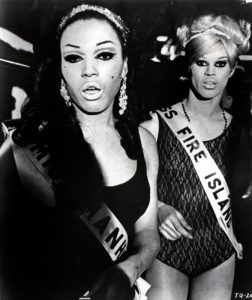Pose: Race and Ball Culture
 I have become an instant fan of Pose, a great new FX show about 1980s ballroom culture. The show is reminiscent of the seminal documentary Paris Is Burning, which similarly showcases LGBT Blacks and Latinos’ lives in New York City.
I have become an instant fan of Pose, a great new FX show about 1980s ballroom culture. The show is reminiscent of the seminal documentary Paris Is Burning, which similarly showcases LGBT Blacks and Latinos’ lives in New York City.
Balls have a long history, starting around the 1900s, which were more like fashion shows and pageants. Back then, they even did ballroom dancing and were judged on appearance and costume. Queens of color were generally not invited to these events. When they were invited, they were expected to lighten their skin and straighten their hair to compete. Sometimes these balls were rigged in favor of white queens. The 1968 documentary The Queen, which is about the 1967 Miss All-American Camp Beauty Pageant drag contest, is, in my opinion, a very boring film, but you can watch it here if you want. Near the end of the film, it is most interesting when the winner declared is a mediocre, forgettable white queen near the 56-minute mark. A much prettier, legendary black queen named Crystal LaBeija, who stormed off the stage when she is awarded third place, should have won the contest. The video below shows LaBeija reading the poor white queen for filth. I can watch this video all day!
“I will sue the bitch!”
“I have a right to show my color, darling. I am beautiful, and I know I’m beautiful.”
The short clip is not only significant for LaBeija’s fierce reading, but it also marked an important cultural shift. LaBeija didn’t sue anybody; what she did do was revolutionize ball culture. LaBeija and fellow queen Lottie hosted their own ball just for black queens a few years later. They also started House of LaBeija, and Crystal led the house as the “mother.” The first ball for queens of color was actually hosted in 1962 by Marcel Christian, who would also change her surname to LaBeija. But House of LeBeija holds the distinction of being the first house to host a ball. After LaBeija’s ball, other houses were created. A house is a group of LGBT-identified folks who compete in balls together and create an emotional support system for group members, many of whom are young, black, and gay and shunned by their biological families because of their sexual and gender identities. A house is a family, and this house system still exists today, thanks to Crystal LaBeija.
After LaBeija died in 1982, Pepper LaBeija became the house’s mother. In addition to the House of LaBeija, there is the House of Xtravaganza, one of the first predominately Latino houses, House of Dupree and House of Ninja, founded by famed voguing dancer Willi Ninja. All four of these houses were featured in Paris Is Burning.
This movie still is influential even to this day. Madonna culturally appropriated voguing into a dance craze. Terms like “shade,” “work,” “gag,” “fierce,” and “giving face” are now part of the normal lexicon. Pepper LaBeija and Dorian Corey taught us why reading is fundamental and inspired a new generation on Viceland’s My House.
Darling, our culture is better because of ball culture.